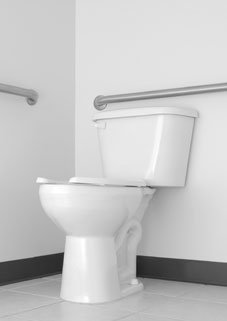Advice: Continence Assessments
 If you are experiencing bowel or bladder incontinence, don’t assume it’s due to ageing. Ask for a continence assessment to discover what’s causing the problem. Perhaps it can be fixed!
If you are experiencing bowel or bladder incontinence, don’t assume it’s due to ageing. Ask for a continence assessment to discover what’s causing the problem. Perhaps it can be fixed!
An assessment will look at what might be causing the incontinence, and identify treatment and management options. Every District Health Board in New Zealand has a team of health professionals (either nurses or physiotherapists) who have received specialist training in continence. They are called continence advisors.
You can arrange an assessment by contacting your local advisor directly, by phoning the Continence Helpline on 0800 650 659, or by seeing your GP. The advisor can either visit you at home, or you can see them at their office.
At the assessment
The continence advisor will help you work out the factors causing your incontinence, and recommend a treatment plan. Often people who develop incontinence simply buy products to manage bowel or bladder leakage, assuming it’s a natural part of ageing. Others are too embarrassed to discuss the problem with their doctor.
It’s really important to have a proper continence assessment, as maybe the problem can be fixed. An assessment will also explore whether a medical problem is causing the incontinence.
At your assessment, the continence advisor will ask about your medical history, your current health status, and what medications you take (including those from the GP, chemist, health food shop, or supermarket). The advisor will also ask about your diet, bowel habits, fluid intake, and when bowel or bladder accidents tend to occur.
The advisor may need to do a physical examination of your tummy or abdomen. If acceptable, they may also check your front or back passage. The advisor may also arrange a urine test, a blood test, or an ultrasound, and any other tests that may be useful.
Solutions
Treatment options will depend on the type and cause of the incontinence. The advisor will work with your GP to treat common problems if these are present, such as a urinary tract infection, constipation, or diarrhoea. He or she will also work with the GP to review medications, dosages and how often they are taken, and identify any new medications that may be helpful.
The advisor might also recommend alterations to your fluid or fibre intake, set up a bladder or bowel retraining programme, teach pelvic floor muscle exercises, plan a toileting programme, suggest aids and appliances such as pads and commodes, or arrange a referral to a specialist for further analysis or surgery.
Funding
If products such as pads are needed to manage your incontinence, the advisor will recommend which ones will work best. Sometimes products are needed for a short time, while following a treatment plan; in other cases they will be needed long-term.
You may be eligible for free continence products from your local DHB or ACC. If you are not eligible, or need extras, the continence advisor will tell you where you can obtain these, often at a reduced cost. Continence products can be purchased directly from a supplier, supermarkets, some DHB hospital supply departments, or your chemist.
If you have an ongoing need for continence products, funding for these may be available through the Disability Allowance, which is administered by Work and Income. To learn more about the Allowance, phone Carers New Zealand’s information centre,
Visit the NZ Continence Association website to view the wide range of information and resources housed there, or if you have specific questions you can phone their toll free helpline 0800 650 659.
Photo: Shutterstock.com, MilesBoyer